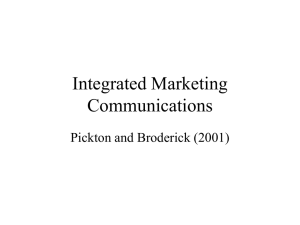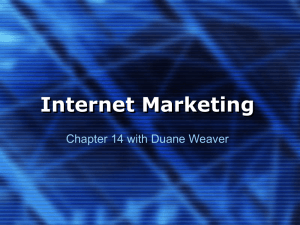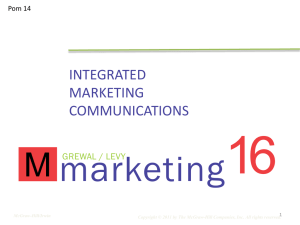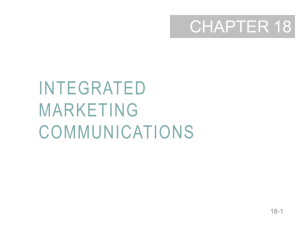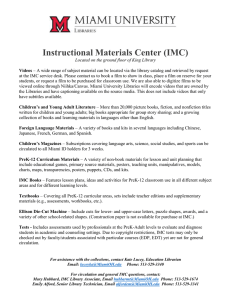JCO 4109 INTEGRATED MARKETING COMMUNICATION
advertisement
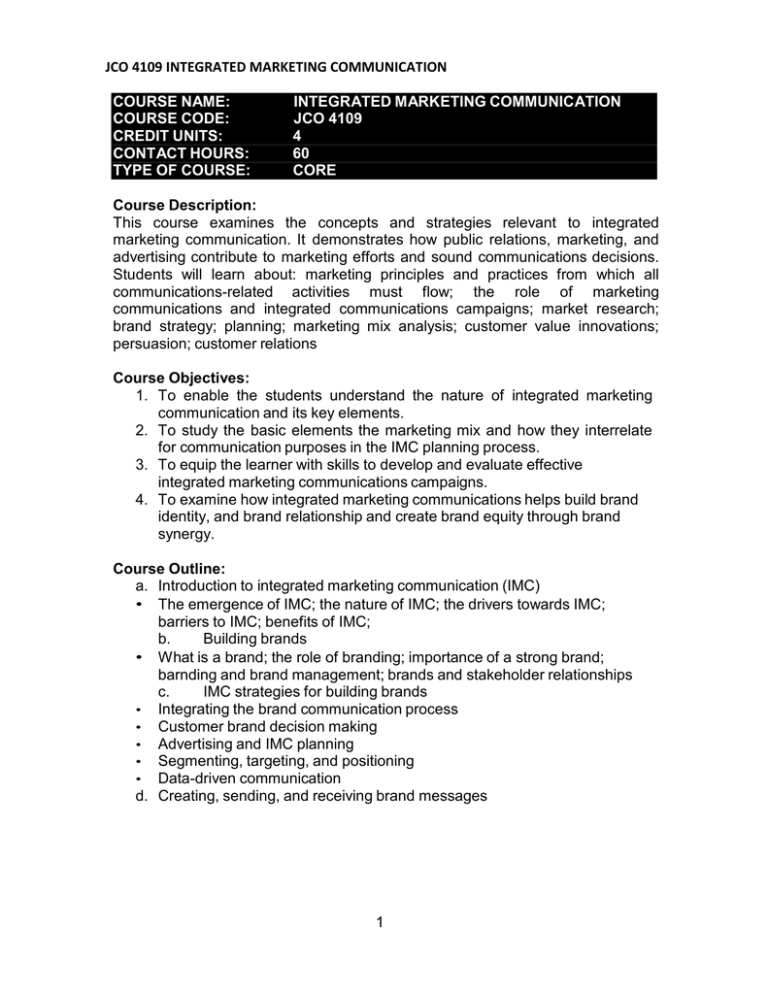
JCO 4109 INTEGRATED MARKETING COMMUNICATION COURSE NAME: COURSE CODE: CREDIT UNITS: CONTACT HOURS: TYPE OF COURSE: INTEGRATED MARKETING COMMUNICATION JCO 4109 4 60 CORE Course Description: This course examines the concepts and strategies relevant to integrated marketing communication. It demonstrates how public relations, marketing, and advertising contribute to marketing efforts and sound communications decisions. Students will learn about: marketing principles and practices from which all communications-related activities must flow; the role of marketing communications and integrated communications campaigns; market research; brand strategy; planning; marketing mix analysis; customer value innovations; persuasion; customer relations Course Objectives: 1. To enable the students understand the nature of integrated marketing communication and its key elements. 2. To study the basic elements the marketing mix and how they interrelate for communication purposes in the IMC planning process. 3. To equip the learner with skills to develop and evaluate effective integrated marketing communications campaigns. 4. To examine how integrated marketing communications helps build brand identity, and brand relationship and create brand equity through brand synergy. Course Outline: a. Introduction to integrated marketing communication (IMC) • The emergence of IMC; the nature of IMC; the drivers towards IMC; barriers to IMC; benefits of IMC; b. Building brands • What is a brand; the role of branding; importance of a strong brand; barnding and brand management; brands and stakeholder relationships c. IMC strategies for building brands • Integrating the brand communication process • Customer brand decision making • Advertising and IMC planning • Segmenting, targeting, and positioning • Data-driven communication d. Creating, sending, and receiving brand messages 1 • • • • • • • • • • • • • • • IMC creative concepts and messages Message execution IMC print, broadcast, outdoor, and product placement media Internet and e-commerce media IMC media planning e. IMC functions Consumer sales promotion and packaging Channel marketing: trade sales promotions and co-marketing Specialized marketing techniques Personal selling Public relations and brand publicity Direct marketing Events, sponsorship, and customer service f. Key issues in IMC Social, legal and ethical issues in IMC International marketing communication Effectiveness, measurements, and evaluations Learning Outcomes: By the end of the course, the learner should be: 1. Able to explain the nature of integrated marketing communication and its key components. 2. Familiar with the skills to design and evaluate effective integrated marketing communications campaigns. 3. Able to develop an integrated marketing communication campaign plan based on marketing principles, concepts and practices within the organization. Method of Teaching/Delivery: • Lectures • Group work and presentations • Guest lectures • Case study analysis • Independent study Methods of Assessment: • Coursework and oral presentation will contribute 40% • The final examination will contribute 60% Readings/Reference Materials/Learning Resources: 1. Duncan, Tom (2005) Principles of Advertising and IMC. 2nd edition. New York McGraw-Hill. 2. Jenkinson, A and Mathews, B. (2007) Integrated Marketing and its implications for personalized customer marketing strategies. J Direct, Data and 2 Digital Marketing Practice. Vol.8 no.3, Palgrave Macmillian, UK. 3
